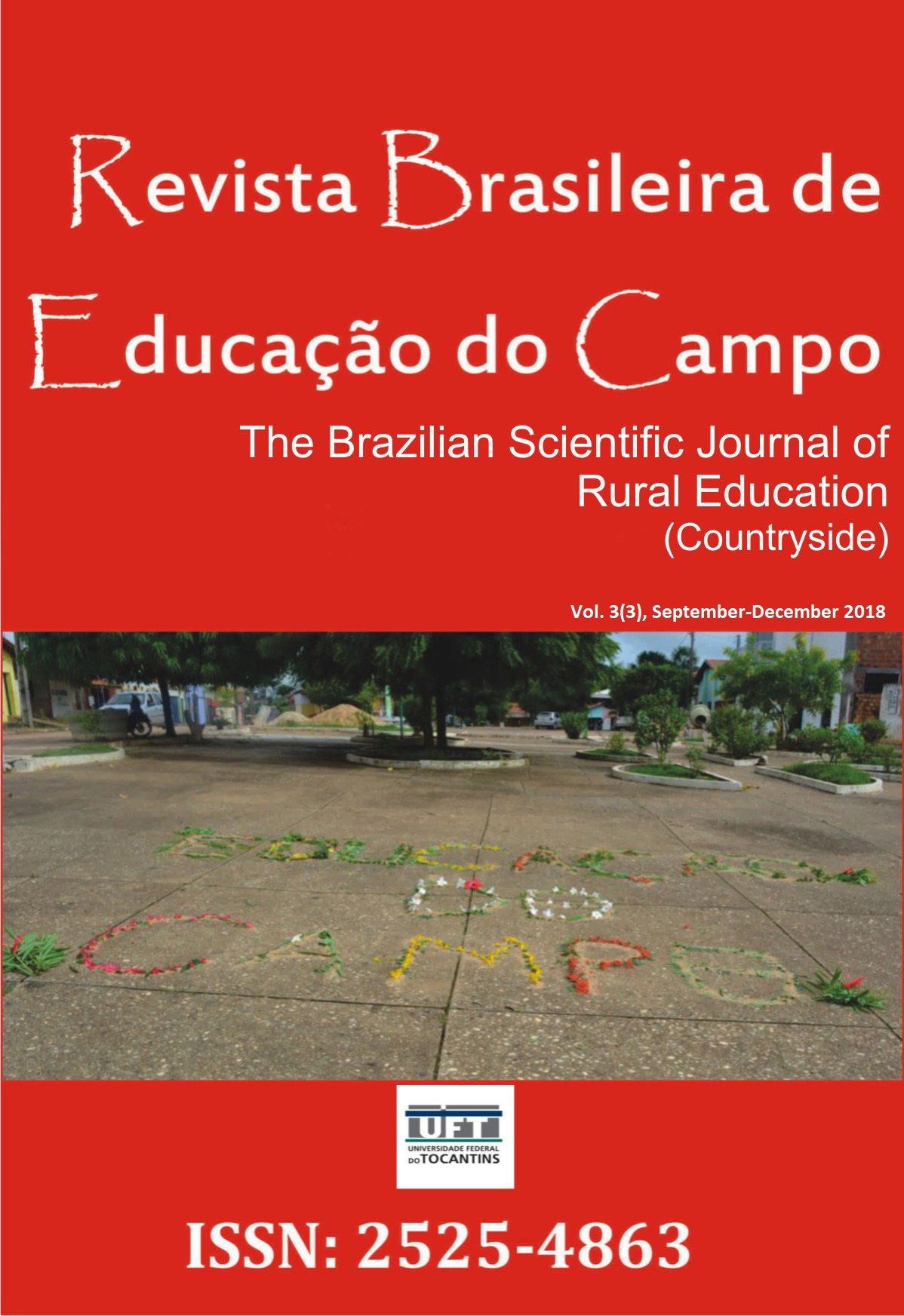Learning in the countryside: pen, hoe and the peasant botany
DOI :
https://doi.org/10.20873/uft.2525-4863.2018v3n3p763Résumé
Neste trabalho, apresentamos e discutimos as experiências da execução do projeto “Troca de Saberes sobre Botânica Camponesa”, realizado ao longo do ano de 2014 no Assentamento Filhos de Sepé (Viamão, RS) com o Grupo Mulheres da Terra e a Incubadora Tecnológica de Cooperativas Populares. Guardiãs de saberes e práticas ancestrais, o Grupo se faz atuante em todas as esferas de produção do assentamento. Ao longo de 12 encontros, diversos temas relacionados às práticas agroecológicas junto à vida camponesa foram tratados utilizando-se diferentes abordagens: teóricas, práticas e reflexivas. Partindo-se de pressupostos educativos que valorizam os saberes populares, assim como a horizontalidade dos processos de ensino/aprendizagem, os encontros contribuíram com o reconhecimento e o fortalecimento da identidade de resistência no Grupo.
Palavras-chave: Agricultura Camponesa, Educação do Campo, Educação Ambiental, Educação Popular, Desenvolvimento Rural.
Learning in the countryside: pen, hoe and the peasant botany
ABSTRACT. In this paper, we present and discuss experiences of the execution of the project “Exchange of Knowledge on Peasant Botany”, carried out during 2014 at the Assentamento Filhos de Sepé (Viamão, RS) with the group “Mulheres da Terra” and the Technological Incubator of Popular Cooperatives. An important characteristic of the Group is the role of women. Maintainers of knowledge and ancestral practices. They become active in all spheres of agriculture production of the settlement. Throughout 12 meetings, several themes related with agroecological practices with peasant life were addressed using different approaches: theoretical, practical and reflexive. Based on educational assumptions that value popular knowledge, as well as the horizontality of teaching/learning processes, the meetings contributed to the recognition and strengthening of the group’s identity of resistance against the current globalized agriculture. Likewise, the progress was made in the construction of autonomy in the face of techniques and knowledge applied to agroecological production.
Keywords: Environmental Education, Peasant Agriculture, Popular Education, Rural Development, Rural Education.
El educarse en el campo: lápiz, azada y botánica campesina
RESUMEN. En este trabajo, presentamos y discutimos las experiencias de la ejecución del proyecto “Intercambio de Saberes sobre Botánica Campesina”, realizado a lo largo del año 2014 en el Asentamiento Hijos de Sepé (Viamão, RS) con el Grupo Mujeres de la Tierra y la Incubadora Tecnológica de Cooperativas Populares. Guardianes de saberes y prácticas ancestrales, el Grupo se hace actuante en todas las esferas de producción del asentamiento. A lo largo de 12 encuentros, diversos temas relacionados a las prácticas agroecológicas junto a la vida campesina fueron tratados utilizando diferentes abordajes: teóricas, prácticas y reflexivas. A partir de presupuestos educativos que valoran los saberes populares, así como la horizontalidad de los procesos de enseñanza/aprendizaje, los encuentros contribuyeron con el reconocimiento y el fortalecimiento de la identidad de resistencia en el Grupo.
Palabras-clave: Agricultura Campesina, Educación del Campo, Educación Ambiental, Educación Popular, Desarrollo Rural.
Téléchargements
Références
Alves, S. A., Marques, G. P., & Mendonça, M. R. (2013). A produção de sementes de variedades crioulas e a construção da autonomia camponesa no Movimento Camponês Popular – MCP – no Brasil. In Anales del 14º Encuentro de Geógrafos de América Latina, Peru.
Bondía, J. L. (2002). Notas sobre a experiência e o saber de experiência. Revista Brasileira de Educação, 19, 20-28. DOI: http://dx.doi.org/10.1590/S1413-24782002000100003
Campos, C. S. S. (2006). Campesinato autônomo - uma nova tendência gestada pelos movimentos sociais do campo. Lutas & Resistências, 1, 146-162.
EMATER. (2001). Dica Agroecológica: Uso de água de cinza e cal como fertiprotetor de plantas. Agroecologia e Desenvolvimento Rural Sustentável, 2(4).
Freire, P. (1992). Assentamento Conquista da Fronteira - Bagé: Palestra do companheiro e educador Paulo Freire. Obra de Paulo Freire: Série Eventos. Recuperado de: http://www.acervo.paulofreire.org:8080/jspui/handle/7891/2415
Freire, P. (1998). Pedagogia do Oprimido. Rio de Janeiro, RJ: Paz e Terra.
Gallo, S. (2012). As múltiplas dimensões do aprender. In Anais do Congresso de Educação Básica: Aprendizagem e Currículo. Florianópolis, SC: UFSC.
Gordh, G., & Headrick, D. H. (2001). A Dictionary of Entomology. Wallingford: CABI Publishing.
Pelwing, A. B., Frank, L. B., & Barros, I. I. B. (2008). Sementes crioulas: o estado da arte no Rio Grande do Sul. Revista de Economia e Sociologia Rural, 46(2), 391-420. DOI: http://dx.doi.org/10.1590/S0103-20032008000200005
Pinheiro, S. (2011). Cartilha da Saúde do Solo e Inocuidade dos Alimentos (Cromatografia de Pfeiffer). Porto Alegre: Salles.
Pinheiro, S. (2015). Saúde no Solo (Biopoder Camponês) versus Agronegócio. Porto Alegre, RS: Juquira Candiru Satyagraha.
Santos, B. S. (1988). Um discurso sobre as ciências na transição para uma ciência pós-moderna. Estudos Avançados, 2(2), 46-71. DOI: http://dx.doi.org/10.1590/S0103-40141988000200007
Santos, B.S. (2002). Para uma sociologia das ausências e uma sociologia das emergências. Revista Crítica de Ciências Sociais, 63, 237-280.
Téléchargements
Publié-e
Comment citer
Numéro
Rubrique
Licence
Proposal for Copyright Notice Creative Commons
1. Policy Proposal to Open Access Journals
Authors who publish with this journal agree to the following terms:
A. Authors retain copyright and grant the journal right of first publication with the work simultaneously licensed under the Creative Commons Attribution License that allows sharing the work with recognition of its initial publication in this journal.
B. Authors are able to take on additional contracts separately, non-exclusive distribution of the version of the paper published in this journal (ex .: publish in institutional repository or as a book), with an acknowledgment of its initial publication in this journal.
C. Authors are permitted and encouraged to post their work online (eg .: in institutional repositories or on their website) at any point before or during the editorial process, as it can lead to productive exchanges, as well as increase the impact and the citation of published work (See the Effect of Open Access).














